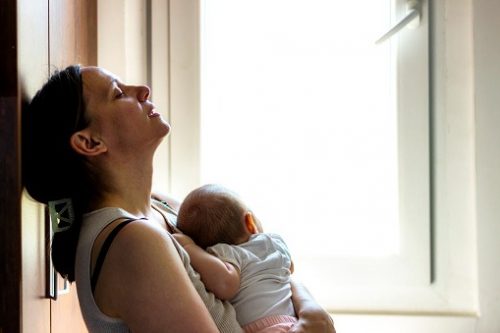I always believed that maternal mental health challenges were exaggerated. I kept telling myself that it was not true, despite the known research and studies I read online and saw on the news. I guess I was too stubborn to think about it because I do not entirely care about that particular health issue. I am confident that as long as I take care of myself and focus more on healthy habits, I am good. I can be positive to manage any stressors, regardless of the physical, emotional, and mental causes. But, damn, I was wrong. Depression, treatment, risk, postpartum, and symptoms are all crucial aspects of maternal mental health that I should have paid more attention to.
This couple of weeks seems to be the worst time of my life. Honestly, I can’t even think about anything because I am too focused on these uncertain thoughts. I was supposed to be happy because I recently gave birth to a healthy baby boy. But it felt different. It felt weird that I didn’t feel like myself at all. I am not sad, disappointed, or angry about the whole experience, though. But I am not that happy either. With that mixture of emotions, I realized that I struggled with something I didn’t expect: postpartum depression.
With my current situation, all I can ask for is help. I genuinely want to identify what I am going through because I now realize that I miscalculated the effects of this mental health problem. I tried to comprehend certain details regarding the emotional struggles after childbirth, including postpartum depression and baby blues, by exploring these commonly asked questions related to health care. Let me know if this information can be trusted by everyone.

Importance of Recognizing and Treating Postpartum Depression
Perinatal mental health challenges, including a history of depression, are serious mental health disorders that affect approximately 15% of new mothers. They are a type of depression that occurs after childbirth, typically within the first few weeks to months postpartum. Symptoms of perinatal mental health challenges, as experienced by the care provider, can be debilitating, and they can have a significant impact on the health and well-being of both the mother and child. The main content of these challenges underscores the importance of early detection and effective interventions to support maternal and child health.
Recognizing and treating maternal mental health conditions after childbirth is crucial for several reasons. Firstly, these conditions can have serious consequences for the mother’s well-being, including an increased risk of suicide, anxiety, and other mood disorders, postpartum psychosis, and other mental disorders. If symptoms persist and are left untreated, these conditions can also lead to chronic or major depression, which can persist long after the postpartum period has ended. Risk factors associated with these conditions should not be underestimated. However, it’s important to note that there is hope and support available. Joining a support group can provide much-needed encouragement and guidance for those navigating the challenges of maternal mental health conditions, offering a lifeline to recovery and improved overall mental health.
Secondly, depression after childbirth can negatively impact the bond between mother and child. Studies have shown that besides affecting breast milk production, maternal depression can affect infant development, including social, emotional, and cognitive outcomes. Children of mothers with this condition may also be at increased risk of behavioral problems, lower IQ scores, and impaired language development.
Thirdly, depression after childbirth can affect the entire family, including the partner and other children. The strain of caring for a new baby while the mother is struggling with depression can be overwhelming, leading to stress and conflict within the family.
Fortunately, this type of depression, like other mental disorders, is treatable. There are several effective treatments available, including medication, psychotherapy, and social support. Early recognition and treatment of depression after childbirth can help mothers recover faster and reduce the risk of long-term complications.
It is essential that healthcare providers, family members, and friends are aware of the signs and symptoms of this condition and that they offer support and encourage the mother to seek help from a mental health professional if necessary.
New fathers can experience depression after childbirth too. According to Postpartum Support International, depression after childbirth happens in 1 in 7 mothers and 1 in 10 fathers. In terms of the partner relationship and child progress, paternal depression after childbirth can have the same negative effect as that of mothers.
What Are The Causes Of Perinatal Mood Disorders?
A climactic drop in hormones in your body after childbirth, particularly estrogen and progesterone, can potentially contribute to a condition characterized by feelings of sadness, anxiety, and emotional instability. Even those other hormones produced by the thyroid gland that continues to drop sharply can trigger mental health issue as well. Thus, when this progresses, it can leave you feeling sluggish, tired, and experiencing negative emotions. It can make you emotionally and mentally unstable.
How Can You Prevent PPD?
There are certain things you can consider to prevent postpartum depression. However, you need to realize that some methods that work well with others do not guarantee the full results you imagine. It would be beneficial if you educated yourself about the impacts of the condition. That way, you can prepare yourself well for the birth of your child. If you have a history of depression, let your healthcare provider know about this. The health care providers can recommend early postpartum checkups for earlier treatment if postpartum symptoms are detected. Always let your feelings known and avoid making major life changes during or even right after childbirth.
Is PPD Curable?
Yes, postpartum depression (PPD) is a severe mental illness that entails professional assistance. Most women’s signs and symptoms of depression tend to stay from 3 to 6 months after they begin and even last longer than that. But despite its overall damage to an individual’s overall health, PPD is highly treatable. Medication and psychotherapy (also called talk therapy) are commonly used to treat postpartum depression. But note, some medications and treatments may show different results. Therefore, an individual should not expect the same outcome as others, for some therapies and medications work depending on the severity of an individual’s condition.
Is PPD Genetic?
PPD or postpartum depression, is a severe, relatively common disorder that affects women who give birth. Usually, it has lifelong implications for the affected individual and her family. Studies reveal that a personal or family history of depression is a risk factor for developing postpartum depression. Although some anecdotal evidence points out that PPD can be inherited, epidemiological evidence shows that circumstances are high regardless of whether the mental condition comes from genetic factors. Postpartum depression can also occur due to perinatal depression, bipolar disorder, and other psychosocial risk factors.
Can A Woman Go Crazy After Giving Birth?
Unfortunately, yes. There are cases in that new moms experience postpartum psychosis. Though it is a rare but serious mental health illness, it still affects women soon after having a baby. Some will experience mild mood changes and might consider it “baby blues” or “postpartum blues,” which usually only lasts for a few days. However, postpartum psychosis is different as it impairs women’s mental health severely, and they may find themselves unable to control their emotions. In worst cases, some new moms engage in self-inflicting harm and suicide due to the condition. Hence, it is essential that when a woman experiences a depressed mood, severe mood swings, and other depressive symptoms after giving birth, seeking help from a mental health provider can be a great help.
How Long Is The Recovery Period After Childbirth?
The postpartum period starts with the first six weeks after a mother gives birth. This period is a crucial time that requires all sorts of care for the mother and her baby. It is essential to stay focused on getting emotionally, mentally, and physically better during this time.

Is It Normal To Cry A Lot After Having A Baby?
A lot of new moms experience strong emotions right after childbirth. Feeling overwhelmed and crying a lot on these days is normal. But be mindful. If the condition becomes unable to understand and struggles with coping with emotional health, it is best to consult professional help. Spend time to consider and check it out for postpartum depression. Do not ignore the symptoms.
What Is A Woman Who Has Recently Given Birth Like?
The postpartum period begins immediately after childbirth. That is because the mother’s body, including her uterus size and hormone levels, returns to a non-pregnant condition. There will be some mild emotional and mental dysfunctions, but it usually does not last long. Unfortunately, for some individuals, their postpartum recovery won’t be just a few days. In some cases, their so-called “baby blues” tend to stick a bit longer, which escalates into a mental health disorder.
How Does Pregnancy Affect Mental Health?
Pregnancy affects women’s mental health, as it makes them feel more vulnerable and anxious. Sometimes, their condition may develop into severe cases of depression. Pregnancy requires a lot of overall wellness and balance. Thus, if expecting moms are not getting enough stability in their emotional and physical health due to their pregnancy needs, the possibility of damaging mental health is very high.
Is PPD A Mental Illness?
Yes. PPD, or postpartum depression, is a mental illness that usually affects women. Some of its severe conditions cause delusions or strange beliefs, hyperactivity, rapid mood swings, and decreased need for or inability to sleep. Also, it promotes Paranoia and suspiciousness, Difficulty communicating at times, extreme agitation and anger, and Hallucinations. It is significantly important to seek professional help when more of these symptoms occur.
Is PPD Serious?
For some women, their PPD or postpartum depression is mild, and after a few days, they recover from emotional and mental health. However, some new moms experience symptoms a few days after delivery that lasts for months. Women who experience postpartum depression will experience good and bad days.
What are the recommended pharmaceutical options for effectively treating depression after childbirth (postpartum depression)?
Good anxiety and depression medication are antidepressant medications because they are shown to be effective. Doctors and licensed medical experts most widely prescribe these. SSRIs include Prozac, Lexapro, Paxil, Zoloft, and Celexa.

How Can We Reduce The Risk Of Perinatal Mood Disorders?
Prevention of maternal mood disorders is crucial in promoting the health and well-being of both the mother and child. While it is not always possible to prevent these disorders, several strategies can help reduce the risk of experiencing such conditions and promote early identification and treatment.
One key strategy for preventing postpartum depression is screening and early identification.
Healthcare providers can screen new mothers for depression during their routine postpartum check-ups using validated screening tools such as the Edinburgh Postnatal Depression Scale (EPDS). Early identification and treatment can help prevent the development of more severe symptoms and reduce the risk of chronic depression.
Education and awareness are also important in preventing postpartum depression. New mothers should be informed about the signs and symptoms of postpartum depression and encouraged to seek help if they are experiencing any of these symptoms. Support groups, such as family members and friends, can also play a role in promoting awareness and encouraging the mother to seek help if needed.
Self-care strategies can also be helpful in preventing this condition. This includes getting enough rest, eating a healthy diet, staying physically active, and practicing relaxation techniques such as yoga or meditation. Mothers should also be encouraged to reach out for support when needed, whether it be from a partner, family member, friend, or support group.
Finally, social support is critical in preventing postpartum depression. This can include emotional support from loved ones, practical support such as help with childcare or household tasks, or peer support from other mothers who have experienced postpartum depression. Healthcare providers can also provide referrals to resources and support services in the community.
In summary, preventing postpartum depression requires a multi-faceted approach that includes screening and early identification, education and awareness, self-care strategies, and social support. By promoting these strategies, we can help reduce the incidence and impact of postpartum depression on mothers and their families.” and replace with other terms.
Insight
I understand that not all new moms deal with postpartum depression, and not all of them can handle it. Like me, I am still trying to figure out how to win back my emotional and mental state because I badly need it right now. But honestly, I am having a rough time with that. But of course, I need to try harder for the sake of my baby, family, and myself.
A friendly reminder to all the new moms out there, please be careful with your mental health. Be well but not too confident about your current psychological state. You might struggle with a lot of complications when you ignore the negative signs and symptoms because chances are. Immediately seek professional help and do not rely on self-diagnosis.
How Do You Recover From Childbirth?
When Is The Most Challenging Time After Childbirth?
What Is The Physical And Emotional Toll Of Childbirth?
Why Do People Experience Emotional Changes After Giving Birth?
What Is The 5-5-5 Rule After Childbirth?
